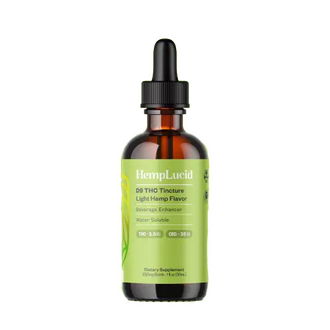![THC Drinks vs Edibles: 5 Key Differences You Need to Know [Complete Guide]](http://hemplucid.com/cdn/shop/articles/1_-_Level_5.png?crop=center&height=276&v=1770653063&width=483)
THC Drinks vs Edibles: 5 Key Differences You Need to Know [Complete Guide]
THC drinks provide quick absorption. You can mix them with water, tea, or coffee. This method is discreet and convenient. On the other hand, edibles take longer to kick in. They pass through your digestive system first. This means the effects last longer.
Choosing between the two depends on your needs. Do you want fast relief or a prolonged experience? Understanding these differences helps you make an informed choice.
Key Takeaways
- Onset Time and Duration: THC drinks provide faster relief, taking effect within 15-30 minutes and lasting 2-3 hours. In contrast, THC edibles take 30 minutes to 2 hours to kick in but offer prolonged effects lasting 4-6 hours.
- Dosage Control: THC drinks usually have clear, consistent dosage information on the packaging, making it easier to control intake. THC edibles can vary more widely in potency, often requiring careful reading of product labels.
- Taste and Experience: THC drinks often mimic the flavors of regular beverages like soda or tea, providing a discreet consumption option. THC edibles come in a variety of familiar flavors such as fruity gummies or chocolaty cookies, but can have a more pronounced cannabis taste.
- Health Considerations: THC drinks generally contain fewer calories compared to edibles, which can be high in fats and sugars. Both forms have potential side effects, with risk of overconsumption due to their delayed or rapid onset.
- Legal and Regulatory Aspects: Both THC drinks and edibles are regulated by state laws, with most requiring consumers to be 21 or older. Availability and legality can vary significantly between states, so it's important to check local regulations.
- Consumer Preferences and Market Trends: Surveys indicate a preference for THC drinks due to their rapid onset and social usability. However, edibles remain popular for their prolonged experience and familiar taste profile. Both markets are experiencing significant growth, showing increasing acceptance and innovation in cannabis products.
Understanding THC Drinks And Edibles
THC drinks and edibles offer distinct experiences and benefits. Each form has unique characteristics, making it essential to understand how they work.
What Are THC Drinks?
THC drinks are cannabis-infused beverages like beer, wine, soda, tea, coffee, and tinctures. They contain varying levels of THC, CBD, CBN, and CBC. Research shows that these drinks are absorbed into the bloodstream through the mouth and stomach, resulting in a rapid onset time of 30 minutes or less. This quick absorption makes THC beverage enhancers a convenient option for those seeking fast relief.
What Are THC Edibles?
THC edibles are cannabis products consumed by eating, such as cookies, gummies, cereal bars, and chocolate bars. Upon ingestion, the THC is absorbed by the stomach and intestine and then metabolized by the liver. This process typically takes 45 minutes to three hours to feel the effects. The slower onset results in a prolonged experience, ideal for sustained relief.
Onset Time And Duration
Understanding the onset time and duration of THC drinks vs. edibles helps you choose the best product for your needs. Here's what you need to know.
How Quickly Do THC Drinks Take Effect?
THC drinks typically take effect within 15-30 minutes. This rapid onset is due to the fast absorption of cannabinoids through the mouth and stomach. Unlike edibles, THC drinks bypass the lengthy digestive process, providing quicker relief.
Example: Drinking a cannabis-infused soda can provide noticeable effects within half an hour.
How Quickly Do THC Edibles Take Effect?
THC edibles take longer to show effects, ranging from 30 minutes to two hours. The delay occurs because THC needs to pass through your digestive system and liver before entering your bloodstream. Edibles offer a slower, more prolonged experience.
Example: A THC-infused cookie might take up to two hours to feel the full effects.
Duration Of Effects For THC Drinks
The effects of THC drinks last around 2-3 hours. This shorter duration matches their quicker onset, making them ideal for those seeking brief periods of relief. After the initial effects, the THC is metabolized and eliminated faster.
Example: A THC beverage enhancer might provide noticeable effects for about three hours.
Duration Of Effects For THC Edibles
THC edibles offer longer-lasting effects, commonly lasting 4-6 hours. The delayed onset is followed by extended relief, which makes edibles suitable for prolonged usage. This matches the digestion and metabolism timeline.
Example: After consuming a THC gummy, you might experience effects for up to six hours.
Dosage Control
Effective dosage control is crucial for a safe THC experience. Both THC drinks and edibles have unique dosage measurement methods.
Measuring THC in Drinks
THC drinks, like cannabis-infused beverages, typically contain a specific amount of THC per serving. This makes it easy to monitor your intake. For example, you might find THC drinks with 5mg, 2.5mg, or 10mg per serving. These values are clearly labeled on the packaging.
Global Market Impact:
- In 2023, the global cannabis beverage market reached $5.83 billion.
- Projected to grow at a 48% CAGR from 2024 to 2032.
- Expected to hit $198.66 billion by 2032.
Measuring THC in Edibles
Measuring THC in edibles can be trickier. Edibles like gummies and cookies usually have higher THC content per serving compared to drinks. Dosage ranges from 2mg to over 50mg per serving, resulting in a more potent experience. Exact dosages often need careful reading of product labels.
Key Numbers:
- 2mg to 50mg THC per edible serving is common.
- Ingestion leads to effects lasting 4-6 hours.
Understanding these differences helps in answering if consuming THC drinks is different than edibles.
Taste And Experience
The taste and experience of THC drinks and edibles vary significantly, influencing consumer preferences.
Flavor Profiles of THC Drinks
THC drinks offer diverse flavor profiles, often mimicking typical beverages like soda or juice. These drinks usually mask the cannabis flavor, providing a pleasant and customizable experience. For instance, some THC beverages taste similar to regular soft drinks, making them appealing for discreet consumption.
Flavor Profiles of THC Edibles
THC edibles encompass a variety of forms like gummies, chocolates, and baked goods. They often use fats like butter, which can dominate the taste, limiting flavor customization. However, their familiar and comfortable taste profiles, such as fruity or chocolaty flavors, make them an enjoyable option for many.
In comparing THC drinks and edibles, the choice hinges on personal preference for flavor and discretion.
Health Considerations
Potential Benefits
THC drinks offer faster absorption, leading to quicker relief from symptoms such as pain or anxiety, typically within 15-20 minutes. They also provide a controlled social drinking experience, making them an inclusive and healthier alternative to alcohol. With lower addiction risk compared to alcohol, THC drinks can be a safer substitute for socializing.
Possible Side Effects
The rapid onset of THC drinks can increase overconsumption risks, particularly for less-experienced users. Overconsumption may lead to adverse effects such as dizziness, paranoia or extreme drowsiness. Conversely, THC edibles take longer to activate, which can cause users to consume more, leading to intensified effects later.
Caloric Content Comparison
A typical THC beverage generally contains fewer calories compared to THC edibles. For instance, THC drinks like sodas or juices may have around 50-100 calories per serving. Edibles such as cookies or brownies can contain over 200 calories per serving due to the added fats and sugars, making THC drinks a lower-calorie option.
Legal And Regulatory Perspective
Understanding the legalities of THC drinks and edibles is crucial. State laws and regulations govern both, impacting availability and consumer experience.
Regulations For THC Drinks
- Availability And Sales: THC drinks are a rapidly growing market due to nanoemulsion technology, enhancing cannabinoid absorption. They still represent a small fraction of the edibles market but are expanding rapidly.
- Legalization: THC beverage legality varies by state. For example, Minnesota legalized THC drinks in 2022, making them widely available. Always check local regulations before purchase.
- Age Restrictions: Most states require consumers to be 21 or older to purchase THC drinks. Always carry ID to verify age when buying your THC drink of choice.
- Market Size: THC edibles, such as gummies and cookies, dominate the cannabis market. They're projected to hit $20.60 billion by 2028, with candies alone accounting for 73% of sales in 2022.
- Standardized Potency: Edibles' potency is carefully regulated, ensuring consistent dosage. This standardization helps avoid the uncertainty of buying from unlicensed sources.
- Age Restrictions: Similar to THC drinks, the legal age to buy THC edibles is usually 21 or older. Confirm state-specific laws for exact details.
Consumer Preferences
Understanding consumer preferences between THC drinks and edibles helps you make informed decisions based on effects, taste, and lifestyle.
Taste and Consumption Preferences
THC Drinks:- Diverse flavors
- Easier social incorporation
- Discreet consumption
- Pronounced THC flavor
- Varieties like cookies or gummies
- Potentially less appealing to some
Onset Time and Duration
THC Drinks:- Faster onset (15-30 minutes)
- Shorter duration (2-3 hours)
- Slow onset (30 minutes to 2 hours)
- Longer duration (4-6 hours)
Personal Preferences and Lifestyle
- Active lifestyle: THC drinks offer quick relief.
- Leisurely experience: Edibles provide prolonged effects.
Survey Data
Surveys show 65% of consumers prefer THC drinks for their rapid onset time and social usability. Those choosing edibles—35%—value the prolonged, intensified experience. Most groups find taste a critical factor in deciding between products.
| Preference | Percentage |
|---|---|
| THC Drinks | 65% |
| THC Edibles | 35% |
Market Trends
The global cannabis beverage market hit $5.83 billion in 2023, expected to grow at 48% CAGR, reaching $198.66 billion by 2032. Meanwhile, the edibles market projected to hit $20.60 billion by 2028 spans substantial market share. Candies drive significant edible sales. Both markets highlight increasing acceptance and evolving product innovations.
Comparative data and market growth patterns indicate robust demand for both, with THC drinks gaining rapid popularity.
Conclusion
Choosing between THC drinks and edibles ultimately depends on your personal preferences and desired effects. If you value quick relief and enjoy a variety of flavors, THC drinks might be your go-to. They offer a convenient and social way to consume cannabis with rapid onset and lower calories.
On the other hand, if you prefer a longer-lasting experience and enjoy familiar treat flavors, THC edibles could be more your style. They provide prolonged effects and a wide range of tasty options, though they require careful dosage control.
Understanding these differences helps you make informed choices, ensuring a safe and enjoyable cannabis experience.
![THC Drinks vs Edibles: 5 Key Differences You Need to Know [Complete Guide]](http://hemplucid.com/cdn/shop/articles/1_-_Level_5.png?crop=center&height=276&v=1770653063&width=483)
Suggested Products from This Article

 WATER SOLUBLE THC
WATER SOLUBLE THC




